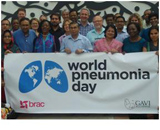 I am in Dhaka, Bangladesh, to mark world pneumonia day and also to learn more about how the UK’s financial contributions to Bangladesh and the GAVI Alliance are helping to change lives on the ground. Since 2010, I have chaired the all party parliamentary group for global action against childhood pneumonia and have particularly focused on the huge burden that pneumonia and other preventable diseases have placed on families and communities in countries across the world and how simple vaccines can drastically reduce this.
I am in Dhaka, Bangladesh, to mark world pneumonia day and also to learn more about how the UK’s financial contributions to Bangladesh and the GAVI Alliance are helping to change lives on the ground. Since 2010, I have chaired the all party parliamentary group for global action against childhood pneumonia and have particularly focused on the huge burden that pneumonia and other preventable diseases have placed on families and communities in countries across the world and how simple vaccines can drastically reduce this.
My interest in pneumonia and the power of vaccines stems from my work in the NHS as a microbiologist. I spent many years working in laboratories investigating different bacteria and viruses. This work highlighted to me that the simplest and most cost-effective means of tackling diseases is through prevention. If vaccines exist, then they are a more effective intervention than waiting for people to contract diseases and focusing on treatment. The strength of the GAVI Alliance is that they are a public private global health partnership that is helping countries to introduce life-saving and underused vaccines. They have already helped to immunise 288 million people since their establishment in 2000 and they have saved over 5 million lives. They hope to save a further 4 million between 2011 and 2015.
GAVI’s work is critical because their support improves access to vaccines against pneumococcal disease and rotavirus, which are the main causes of pneumonia and diarrhoea. Together these account for nearly 40% of all deaths under 5.
During my visit to Bangladesh, I have been lucky enough to see how vaccines are being used in local communities to combat some of the most prevalent diseases. Today we visited a sub-district health centre in Rajendrapur and they showed us how vaccines are distributed from the central store in Dhaka, stored on site, and then sent to the 40 or so community centres that serve the sub-district. It is at this point that the vaccines are used to protect children.
What became apparent was that this was a highly organised community based system. The local people had taken ownership of their community healthcare programmes. The GAVI Alliance finances the purchase of vaccines and the government contributes a share of the cost. It is the grassroots education about maternal and child health issues and the delivery of health services at the community level that is driving national improvements to health indicators. Everywhere we visited we met community chairmen and health workers whose job it was to mobilise the local people and educate them about healthcare.
We saw local notice boards distributing the latest information about dates for vaccinations, advice on maternal health as well as contact numbers that people can ring if they are unsure of their healthcare provision. Equally local people held immunisation sessions on certain days in their houses, so that the local people could come and ensure their children are immunised.
Overall it was extremely encouraging and it was plain to see why that district had 83% population coverage for their major vaccines. I hope this situation is replicated across Bangladesh, so that they are able to reduce the burden of terrible diseases like pneumonia and diarrhoea.
Jim Dobbin MP, is the chair of the APPG for global action against childhood pneumonia.
The APPG is solely funded by the international vaccine access centre based at Johns Hopkins University through money paid by the GAVI Alliance.
